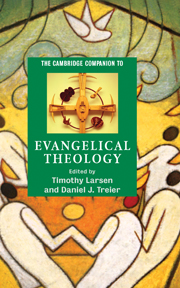Book contents
- Frontmatter
- 1 Defining and locating evangelicalism
- Part I: Evangelicals and Christian doctrine
- Part II: The contexts of evangelical theology
- 10 Evangelical theology and culture
- 11 Evangelical theology and gender
- 12 Race and the experience of death: theologically reappraising American evangelicalism
- 13 Evangelical theology and the religions
- 14 Evangelical theology in African contexts
- 15 Evangelical theology in Asian contexts
- 16 British (and European) evangelical theologies
- 17 Evangelical theology in Latin American contexts
- 18 Evangelical theology in North American contexts
- Index
12 - Race and the experience of death: theologically reappraising American evangelicalism
from Part II: - The contexts of evangelical theology
Published online by Cambridge University Press: 28 September 2007
- Frontmatter
- 1 Defining and locating evangelicalism
- Part I: Evangelicals and Christian doctrine
- Part II: The contexts of evangelical theology
- 10 Evangelical theology and culture
- 11 Evangelical theology and gender
- 12 Race and the experience of death: theologically reappraising American evangelicalism
- 13 Evangelical theology and the religions
- 14 Evangelical theology in African contexts
- 15 Evangelical theology in Asian contexts
- 16 British (and European) evangelical theologies
- 17 Evangelical theology in Latin American contexts
- 18 Evangelical theology in North American contexts
- Index
Summary
. . . the politics of race is ultimately linked to the politics of death.
Achille MbembSome boards were laid across the joists at the top [of the house], and between these boards and the roof was a very small garret, never occupied by any thing but rats and mice . . . To this hole I was conveyed . . . [and it] was to be my home for a long, long time.
Harriet A. JacobsAMERICAN EVANGELICALISM: TOWARD A THEOLOGICAL MODE OF STORYTELLING
Once upon a time not too long ago, religious historians told the story of American evangelical Protestantism - that staple of American religion and bedrock of American identity - as if, at best, black people were not central actors; as if, Ralph Ellison might say, they were “invisible.” At worst, the tale was told as if black folks existed not at all; as if black folks were not historical subjects; as if, both as a group and as distinct persons, they were persone non gratae.
But a new breed of religious historian eventually arose, and new questions dawned. The new breed recognized the incompleteness of their inherited story of American religion, generally, and American evangelicalism, particularly. The saga had to clarify the signal importance of black folks, account for chattel slavery, and foreground the rise of black evangelicalism.
- Type
- Chapter
- Information
- The Cambridge Companion to Evangelical Theology , pp. 177 - 198Publisher: Cambridge University PressPrint publication year: 2007
- 1
- Cited by

